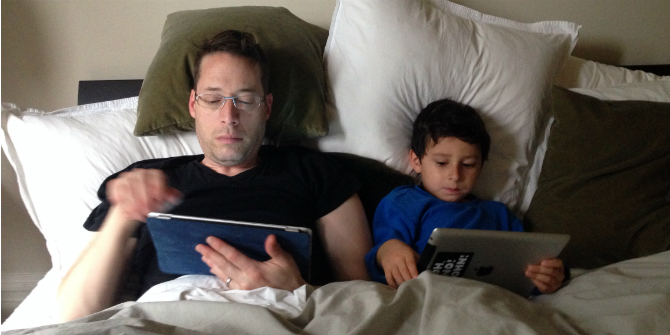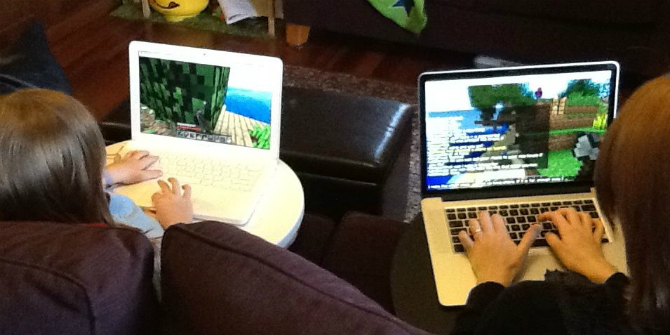 A four-year doctoral study into the digital practices of teens in South-East and North-Central Nigeria found that Nigerian teens rely extensively on the mobile phone and the mobile internet for social connectivity, and social media is a decisive factor for the children’s happiness, relief from stress and boredom, and for managing mental health. Yet teens still lack proper support in developing digital skills and avoiding risk online, writes Chikezie Uzuegbunam. Chikezie E. Uzuegbunam has recently been awarded a PhD in Media Studies and is a teaching and research assistant in Media Studies at the Centre for Film and Media Studies, University of Cape Town, South Africa. [Header image credit: Tech Kidz Africa]
A four-year doctoral study into the digital practices of teens in South-East and North-Central Nigeria found that Nigerian teens rely extensively on the mobile phone and the mobile internet for social connectivity, and social media is a decisive factor for the children’s happiness, relief from stress and boredom, and for managing mental health. Yet teens still lack proper support in developing digital skills and avoiding risk online, writes Chikezie Uzuegbunam. Chikezie E. Uzuegbunam has recently been awarded a PhD in Media Studies and is a teaching and research assistant in Media Studies at the Centre for Film and Media Studies, University of Cape Town, South Africa. [Header image credit: Tech Kidz Africa]
Research into the digital landscape of African ecosystems is still in its developmental stages, as opposed to the spectrum of scholarship from parts of the Global North. Although a substantial amount of research exists in Africa on the uptake and appropriation of digital technology, little is known about the digital experiences of the younger category of ‘youth’ – preteens and teenagers in the continent. There seems to be a paucity of and apathy towards new media studies as it relates to children in Africa.
A four-year doctoral study by the author, with fieldwork in South-East and North-Central parts of Nigeria, culminating in data from 16 focus groups and survey of 380 respondents in rural and urban spaces, explored the digital lifeworlds of young people aged 13 to 18. The study provided a multi-layered portrait of the ways in which Nigerian teens access, understand, work and play with the digital technologies that are available to them, and found a growing and significant number of Nigerian teens have access to digital technologies. It also paid attention to how young people constitute their digital lives and the role played by contextual dynamics and community networks such as family, school and others.
Against the backdrop of the need to shift focus from the naturalised way of looking at children as incompetent ‘human becomings’, the study took a child-centred approach by relying on the children’s voices, perspectives and opinions alone. Young people’s subjective, subordinate and marginalised position is a global phenomenon – even though young people in Africa constitute the majority of the population, their voices are rarely heard or taken seriously as they are viewed as both vulnerable and disruptive.
Teens’ access to digital technology
Nigeria is one of the African countries with the highest and consistently growing internet penetration. The study found that a growing number of Nigerian teens have access to digital technologies, particularly mobile phones and the internet. Many of them have access to either a shared smartphone, or personal smartphones, or just feature phones bought by their parents, guardians, or older relatives. The study found that 23 percent acquired mobile phones from their personal savings, without parental support.
In terms of internet access, the mobile internet is the most popular form of access. The extent of the young people’s expertise with the use of mobile phones and the internet is located between the “dabblers” and the “proficients” – borrowing from a study by UNICEF and Intermedia’s study of young people in Kenya.
The frequency of mobile phone usage by teens in Nigeria, the length of time they spend using mobiles and the internet, is quite significant. Two-thirds (66 percent) of the children used mobile phones for between 1 to 5 hours whenever they got a chance. The use of and access to other digital technologies or devices such as computers, laptops and tablets is not popular; this is occasional or non-existent.
A small number of the teens in rural areas have their own mobiles and regular access to the internet, with alternative access through their relatives and close friends. This highlights the marginalities in Nigerian children’s access to and practices with digital technologies: cost of smartphones, cost of internet connectivity, compromised internet access in rural areas, huge gaps in digital skills and digital literacy, and strict parental mediation.
Impact of teens’ uses and domestication of technology
Nigerian teens’ social connectivity indicated that they rely extensively on the mobile phone and the mobile internet to communicate, stay connected, share, and to feel a part of a social group. Mobile phones provide a dependable means for seamless communication and accomplishment of communicative goals like making plans, asking for and offering help, and reducing the cost and stress of friendship. Furthermore, young people’s social connectivity is enhanced through social networks, mainly Facebook, WhatsApp, Facebook Messenger and Instagram. The importance of social connection is such that social media is a decisive factor for children’s happiness, relief from stress and boredom, and for managing their mental health.
Young people attach great relevance to digital technologies for schoolwork and quick access to general and specialised information and news – much more than they do with the old or legacy media and books. Digital technologies such as mobile phones are appropriated in the domestic setting as tools for childminding, child monitoring and emergency control between and amongst Nigerian teens and their parents, guardians and older relatives.
Digital technologies such as mobile phones and the internet support Nigerian teens in self-learning or informal learnings. However, teens’ appropriation of technology for personal development and self-learning seems gendered and classed, as the use of digital technologies for this purpose is mainly by privileged male children in urban cities, much more than females and those who live in the rural or even peri-urban areas.
Teens’ perceptions of technology
Aside from these positive perceptions, many teens believe that mobile phones and the internet distract them from their studies and home chores, make them contemplate exam malpractice, spend excessive time on mobiles, and expose them to bad movies, pornography, online grooming, meeting strangers, and negative role-modelling. In light of the above, many of them perceive that technologies should be avoided by children until they are out of secondary school, since technologies are things to be wary of, things that disrupt their sense of decency and morality passed down to them by adults and their socio-cultural value systems.
Gatekeepers’ role in children’s practices with and negotiation of digital technologies
From the children’s viewpoint, schools, parents, guardians, and other adults play a gatekeeping role in the children’s practices with and negotiation of technology. There are two positions adopted by gatekeepers: those who encourage and support the young people to use technology and those who discourage the children and play the moral panic card effectively (i.e. prohibitors and moral panic mongers). In urban settings, much more than rural, some parents and godparents encourage and support their children to use digital technologies: they buy mobiles for them or allow them to use theirs or their computers.
There is an in-betweenness that underpins parents’ and guardians’ mediation of teens’ access to and use of technology. The children reported that these ‘gatekeepers’ encourage and at the same time, discourage them simultaneously. This is linked to their ambivalent and preconceived notion of the usefulness and pitfalls inherent in teens’ use of technology. The children found the range of parental mediations and rules mostly annoying, intrusive and authoritarian.
Teachers encouraged the teens to use the internet for their assignments and as a source of information even as the ‘no digital device policy’ was enforced in all the schools used for this study. Notably also, in all the schools – except for one located in an urban area of FCT-Abuja – there were no functional ICT labs and little or no training given to the children.
Deeper issues to consider
It appears that Nigerian parents, schools and adults who mediate and control children’s digital practices do so from a socio-cultural and contextually relevant positionality; meaning that they prioritise traditional notions of familial authority and socialisation. As one of the children in an urban area said about their parents’ acceptance of their phone use:
“My parents…when they ask me to help them and research something, but when I am using it for my personal use, no way. They will tell me I use it too much and also other elders around me they feel like it is disrespectful that at my age I am using such a big phone and they don’t.”
Much like in South Africa, many Nigerian parents, guardians and teachers lack the requisite skills and literacies necessary to support children’s digital practices and opportunities. Consequently, this results in new divides – digital knowledge divide or second-level digital divide – and unchecked risks like access to pornography, online grooming and identity issues. Furthermore, as confirmed by a recent study of teens in Nigeria by an NGO, schools in Nigeria lack basic government support in terms of setting up and maintaining digital infrastructures and a digitally-supportive environment.
Nigerian teens’ digital lifeworlds have been heavily invested with complexities and not-so-straightforward narratives. Young people appear to be caught in a vortex of conflicting perceptions and views regarding digital technologies. There is a need in low- and middle-income countries for execution of suitably domesticated programmes and policies that encourage children to use digital technologies safely and effectively in formal educational and similar spaces. These would also help ensure that they maximise the benefits of their digital practices and prepare them for a smooth transition to adulthood.
The study concluded that techno-shaming children into silence, fear, scepticism, guilt or moral panic is a common, but flawed strategy. Instead, it is suggested that government, schools and families should reconsider the precarious subjective and marginalised position of young people and allow them the agency to contribute to decisions relating to their digital lives. More than ever, Nigerian teens will require access to quality and affordable education as well as skilled and supportive digital enablers and mentors if they must become their full selves.
This post gives the views of the authors and does not represent the position of the LSE Parenting for a Digital Future blog, nor of the London School of Economics and Political Science.





